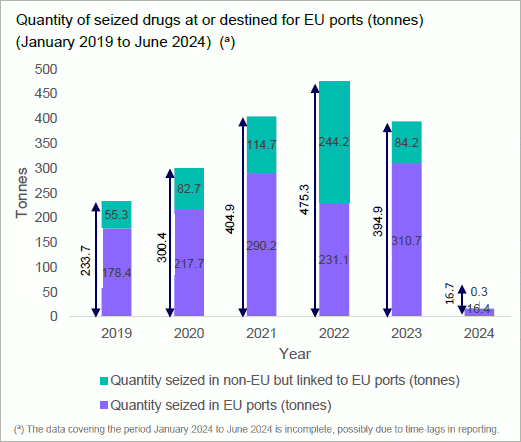
On the occasion of today's celebration of the
International Drug Abuse and Illicit Trafficking,
the European Union Drugs Agency (EUDA) and Regional Intelligence
Liaison Office for Western Europe (RILO-WE) of World Customs
Organization (WCO) presented the report "Seaports:
monitoring the EU's floodgates for illicit drugs" which
offers the first detailed overview of drug trafficking that
passes through the ports of the European Union and which aims to
strengthen the ability to monitor the evolution of the
traffic in these key hubs for EU trade.
The report explains that between January 2019 and June 2024, more than
1,826 tons of illicit drugs were
seized in EU ports or in transit to ports
of which more than 1,244 tons were seized within the
harbours. The largest quantity (491 tonnes) was
seized in Belgian ports, followed by drug seizures in the
ports of Spain (388 tons), Holland (195 tons),
Italy (70 tons) and Germany (47 tons). Approximately
1,507 tons of drugs (83% of the total) were seized
on container ships.
Cocaine is by far the most popular drug
trafficked, accounting for about 82% (1,487 tons) of the total
of the drugs intercepted in the period, followed by the resin of
cannabis (260 tons). In the ports of Antwerp and Rotterdam there are
the largest quantities of cocaine were seized
(approximately 443 tonnes and 181 tonnes respectively) and heroin
(8.1 tonnes and 5 tonnes respectively). In Spanish ports
of Las Palmas de Gran Canaria and Huelva, the
higher quantities of cannabis resin (42 respectively
tons and 30 tons). During the period January 2019 -
June 2024 at least 21.7 tons of Captagon were
intercepted in EU seaports, most of them
from a seizure of 14.2 tons in 2020 in
port of Salerno.
The report points out that the extent and regularity of the
of large shipments (with an average of over 500 kg of cocaine and
1.3 tons of cannabis resin per shipment) confirm that
criminal networks use EU ports to smuggle
large quantities of drugs, in particular cocaine. That
it also implies a significant degree of network penetration
organised criminal offences in European ports, including the probable
corruption of part of the port staff. In addition, in the
there have been frequent episodes of violence related to the
drug trafficking.
